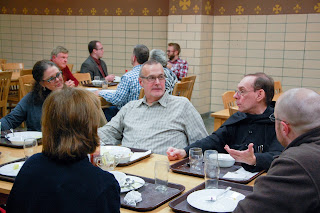We have just completed a wonderful week at
Conception Abbey, full of learning, prayer, and table fellowship. Time shifts when there; bells and times of
prayer order the rhythms, and we tend to look at our watches or smart phones a
little less frequently. We do not hurry
at meals, but we linger in the company of collegial friends and open our lives
to one another. It is a renewing time.
One of the key
insights of the Rule of St Benedict
is that the Christian life is best formed in community. The heroic solitary endeavor usually
founders, and we learn from this spiritual master that we cannot be faithful
alone. Listening to our common
challenges and paying attention to the back stories of those who seek to represent
Christ as ministers is a means of encouragement to those who do not want to
grow weary in well doing.
Understandably, many came to the week weary after guiding their
congregations through the Advent and Christmas season.
It is bracing to
read the Psalter throughout the liturgy of the hours. You may recall that this monastic community
works its way through all 150 Psalms every two weeks. (Some in the more conservative tradition of
Benedictine life think this is rather lax!)
At 6 am you may hear of what God did to those who rebelled in the
wilderness (Psalm 78) or what is in store for the children of the enemies of
God (Psalm 137) or the despair of those expelled from Jerusalem to Babylon
(Psalms 74 and 79). What a way to start
a day!
There is frank
realism in the Psalter, and praying these words awakens us to perceive how
deeply the world is always embroiled in violence. We need to relinquish the sword and trust God
with the outcomes of history. Somehow
saying the vitriol against enemies out loud offers it up to God. If it cannot be said out loud, it probably
cannot be redeemed, Brueggemann instructs.
It is much better to curse the enemy than to raise your hand against
that one, the Psalter teaches.
We learn a great
deal about healthy community through observing the lives of the monks. They are generous in sharing of their
spiritual pilgrimage in monastic life.
Abbot Benedict, only six weeks into his new role, shared significant
insights about humility and authority.
Humility is knowing the truth of who one is before God and others;
authority is utilizing one’s position to help others focus their desire for
God.
Lessons learned
there can be carried into our churches, our families, and our vocations. Listening for the voice of God within each
community will strengthen our walk to maturity in Christ, which is our true
destiny.
Molly T. Marshall
Central prepares creative leaders for diverse ministry contexts.









No comments:
Post a Comment